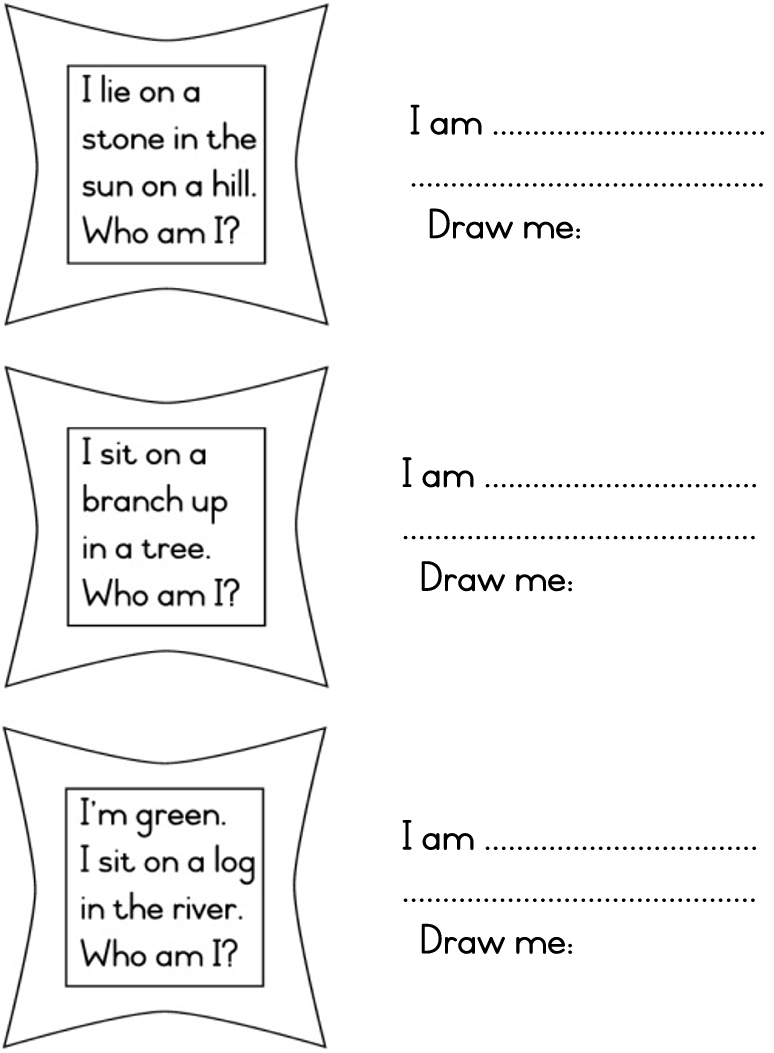| << Chapter < Page | Chapter >> Page > |
We all know where Willy Wop and his family live. Well, surprise! surprise! Daddy Wop is going to bring Willy Wop to come and visit us!
They have to go all the way through the forest. They have to follow the winding trail on the other side of the forest. Then they must go over the hill and follow the long, narrow path down the hill until they come to the deep, deep river. There they must find the raft, which is hidden in the long grasses so that they can cross the river. We will meet Willy at the river and take him to our homes to spend a few days with us.
1. What kind of games would you play with such a little forest boy?
2. Will you also take him fishing?
3. Which games do you play that will be new to Willy?
4. How will you take Willy to other places?
5. What do you think Willy will say about all these new experiences?
| LO 1.3.6 | LO 1.3.7 | LO 2.1 | LO 5.3.2 |
Your home.

Willy’s home.

| LO 1.1 | LO 2.1 |
| LO 2.8 | LO 2.8.2 | LO 5.2.4 |
The little bird said:
“Good morning, dear Willy, my friend”,
As he sat on the branch of a tree,
“Where are you going so early this morning?”
And Willy said:
“Good morning, little bird in the tree,
I’m visiting my friends in the city.”
And Sammy the Snake said:
“Good afternoon, dear Willy, my friend,”
As he lay in the sun on the stone,
“Why do you climb this hill so high?”
And Willy said:
“Good afternoon, Sammy, up there on the stone,
I’m visiting my friends and they’re far from home.”
And the frog said: “Good evening, dear Willy, my friend,”
As he sat on the log in the river,
“Where are you sailing to on your raft?”
And Willy said:
“Good evening, little green frog in the river,
I’m visiting my friends and I’m beginning to shiver.”
With a wave of his hand
He set off to the land
Where his friends were waiting for him.
G.J.M.
| LO 1.3 | LO 1.3.2 | LO 2.9.4 | LO 2.8.3 |

| LO 1.3.4 | LO 1.4 | LO 4.5.4 |
Learning Outcome 1: LISTENING : The learner is able to listen for information and enjoyment and respond appropriately and critically in a wider range of situations.
Assessment Standard 1.1: We know this when the learner listens attentively to instructions and announcements, and responds appropriately;
Assessment Standard 1.3: We know this when the learner listens with enjoyment to short stories, rhymes, poems and songs from a variety of cultures, and shows understanding:
1.3.2 acts out parts of the story, song or rhyme;
1.3.4 draws a picture of the story, and writes a few words about it;
1.3.6 draws a picture of the story, and writes a few words about it;
1.3.7 expresses feelings about the story;
Assessment Standard 1.4: We know this when the learner listens, enjoys and responds appropriately to riddles and jokes.
Learning Outcome 2: SPEAKING : The learner is able to communicate confidently and effectively in spoken language in a wide range of situations.
Assessment Standard 2.1: We know this when the learner talks about personal experiences, feelings and news;
Assessment Standard 2.8: We know this when the learner contributes to class and group discussions:
2.8.2 reports back on behalf of group following group work;
2.8.3 responds to questions asked by listeners;
Learning Outcome 4: WRITING : The learner is able to write different kinds of factual and imaginative texts for a wide range of purposes.
Assessment Standard 4.5: We know this when the learner writes so that others can understand, using writing conventions:
4.5.4 writes own sentences, with the support of writing frames where necessary;
Learning Outcome 5: THINKING AND REASONING : The learner is able to use language to think and reason, and access, process and use information for learning.
Assessment Standard 5.2: We know this when the learner uses language to think and reason:
5.2.4 identifies similarities and differences, using appropriate language;
Assessment Standard 5.3: We know this when the learner uses language to investigate and explore:
5.3.2 offers explanations and solutions.

Notification Switch
Would you like to follow the 'English home language grade 1' conversation and receive update notifications?